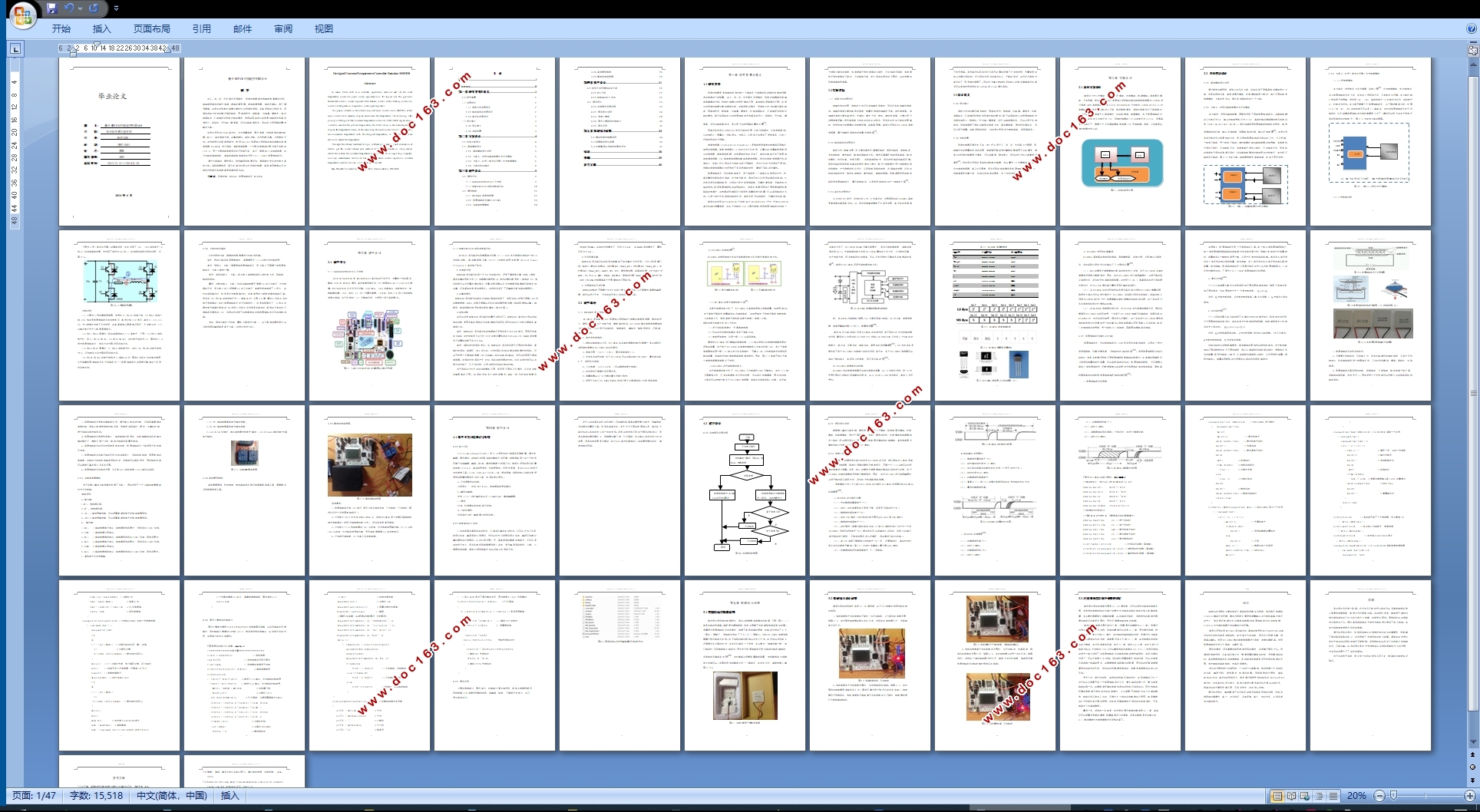基于MSP430的恒温控制器设计

基于MSP430的恒温控制器设计(任务书,开题报告,外文翻译,论文14000字)
摘 要
在工、农、医、生活等许多领域中,恒温控制器都发挥着非常重要的作用。其典型用途有控制气体阀、燃油炉调节器、电加热调节器、制冷压缩机、闸门调节器等。此设计的恒温控制器主要针对的是容积受限、功率受限的应用场合,而传统冷却方法为机械压缩式制冷,因其体积大、能耗高、污染重、噪声大、难控制等缺点,不能满足该恒温控制的要求,利用珀耳帖效应的半导体制冷技术具有体积小、冷却快、无污染、精度高,且可以制热等特点,是这些应用领域的最佳解决方案。
此设计采用MSP430单片机,作为测量温度,显示温度,控制温度的微控制器(MCU),其处理能力强、运算速度快、超低功耗、片内资源丰富、方便高效开发。此恒温设计的基本原理为:利用DALLAS半导体公司研制的单总线数字温度传感器DS18B20进行测温,读取测温结果,一方面将温度实时显示到开发板的LCD上;另一方面判断温度是否处于恒温区间,若不,根据MCU的判断结果,将开启制冷或者制热,其制冷或者制热部件将采用TEC1-12706半导体制冷片。
通过方案确定、硬件设计、软件编写和结果评估,得到相对优化的控制方案和方法。实际结果表明,基于此单片机设计的恒温控制器,其测温灵敏度以及控温回归恒温区间速度都是很高和很快的。 [来源:http://www.doc163.com]
关键词:恒温控制 MSP430 半导体制冷片 DS18B20
Design of Constant Temperature Controller Based on MSP430
Abstract
In many fields, such as in industry, agriculture, medicine and life, the const temperature controller plays a very important role. It’s typical use: the gas valve thermostat control; control regulator fuel furnace; control electric heating controller; control of refrigeration compressor; control gate regulator.
This paper is based on the ultra-low-power micro control unit, MSP430, as the micro controller to measure, display and control the temperature. The following is the principle of design for the constant temperature controller: a DS18B20 digital sensor is used to measure the present temperature, the LCD screen in the Launchpad will display the temperature value; At the same time, the microcontroller will compare the environmental temperature with the designed temperature, so as MCU do some actions to adjust the temperature.
Through the scheme, hardware design, software programming and evaluation of results, get the control scheme and method of relative optimization. The practical results show that, the constant temperature controller based on single chip computer, not only measurement sensitivity but also temperature control regression constant temperature interval velocity is very high and very fast.
Key Words: Constant temperature, MCU, Semiconductor, DS18B20
[资料来源:https://www.doc163.com]

目 录
摘 要 I
Abstract II
第一章 研究背景及意义 1
1.1研究背景 1
1.2发展状况 2
1.2.1测温方法发展状况 2
1.2.2制冷部件的发展状况 2
1.2.3单片机发展状况 2
1.3设计意义 3
1.3.1设计意义 3
1.3.2市场前景 3
第二章 方案设计 4
2.1总体方案设计 4
2.2 具体模块设计 5
2.2.1 具体模块设计说明 5
2.2.2 方案1:使用双路继电器作为开关模块 5
2.2.3 方案2:H桥(电流逆变器)作为电源模块 6 [资料来源:http://Doc163.com]
2.2.4 方案比较与确定 8
第三章 硬件设计 9
3.1 硬件平台 9
3.1.1 SEED-EXP430F5529开发板 9
3.1.2 MSP430F5529超低功耗单片机 10
3.2 硬件耗材 11
3.2.1 DS18B20温度传感器 11
3.2.2 半导体制冷片(TEC1-12706) 15
3.2.3 双路继电器模块 18
3.2.4其他硬件耗材: 19
3.2.5整体连接实物图: 19
第四章 软件设计 21
4.1软件开发环境和语言介绍 21
4.1.1 CCS介绍 21
4.1.2 MSP430的C语言 21
4.2 程序设计 23
4.2.1总体程序流程流程 23
4.2.2 程序设计说明 24
4.2.3 测温小模块 24
4.2.4 显示小模块和控制部分 30
4.2.5 程序目录 32
第五章 软硬结合结果 34 [资料来源:Doc163.com]
5.1模拟恒温控制器说明 34
5.2软硬结合设计成果 35
5.3注意事项以及制冷效果的评定 37
结论 38
致谢 39
参考文献 40
[资料来源:Doc163.com]
